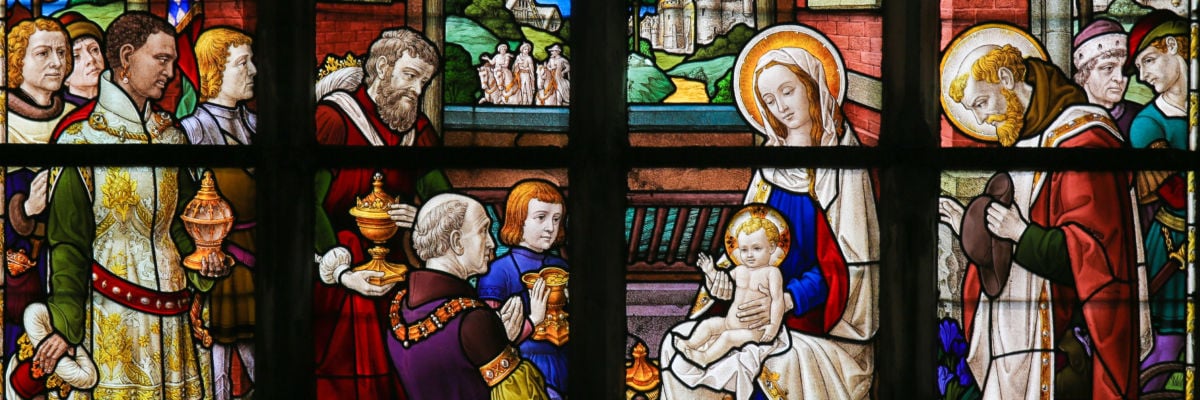
Homily for Epiphany Sunday, 2021
When Jesus was born in Bethlehem of Judea,
in the days of King Herod,
behold, magi from the east arrived in Jerusalem, saying,
“Where is the newborn king of the Jews?
We saw his star at its rising
and have come to do him homage.”
When King Herod heard this,
he was greatly troubled,
and all Jerusalem with him.
Assembling all the chief priests and the scribes of the people,
He inquired of them where the Christ was to be born.
They said to him, “In Bethlehem of Judea,
for thus it has been written through the prophet:
And you, Bethlehem, land of Judah,
are by no means least among the rulers of Judah;
since from you shall come a ruler,
who is to shepherd my people Israel.”
Then Herod called the magi secretly
and ascertained from them the time of the star’s appearance.
He sent them to Bethlehem and said,
“Go and search diligently for the child.
When you have found him, bring me word,
that I too may go and do him homage.”
After their audience with the king they set out.
And behold, the star that they had seen at its rising preceded them,
until it came and stopped over the place where the child was.
They were overjoyed at seeing the star,
and on entering the house
they saw the child with Mary his mother.
They prostrated themselves and did him homage.
Then they opened their treasures
and offered him gifts of gold, frankincense, and myrrh.
And having been warned in a dream not to return to Herod,
they departed for their country by another way.-Matthew 2:1-12
“They were overjoyed at seeing the star.” The Latin or Greek would have it as “They were greatly joyed.” I like our English compound better. Overjoyed is a very particular and beautiful English word. It expresses the sense of excess, of abundance, that accompanied their long journey and its marvelous and yet strange (for them) conclusion. Everyone associates Christmas with gift-giving, and yet not everyone associates Christmas with Christ, and even less with the second syllable of the word, “Mass.” But the Magi were intent on giving gifts as the fulfillment of their long and arduous journey west from Chaldea to Judea.
What did the wise men find? Not what they might have expected. There was no palace, there were no attendants, there was no display of earthly power or destiny; there was just a little infant in a humble dwelling with his mother. What convinced them, after all their inquiries, that this little one was the king they had been seeking?
Surely the miraculous star was a start. It was this that told them where he was to be found. But this sign would not be enough. It had appeared and disappeared. St. Matthew give us more than a hint as to what—or who—made them prostrate themselves and adore and offer their rich gifts, so much in contrast with the humility of the child’s surroundings.
“On entering the house they saw the child with Mary his mother. They prostrated themselves and did him homage. They opened their treasures and offered him gifts of gold, frankincense, and myrrh.”
We can scarcely imagine the trial of faith the Magi endured as they followed the star with their entourage. They had little idea of what to expect; least of all did they expect a poor child in a poor dwelling in a poor village. And yet at this point, when they entered the house, they encountered something unexpected—and something that would have been taken for granted had this mother not been a greater sign than any star in the heavens or any prophecy of the time and place of the king’s birth.
Mary is the all-convincing sign of the presence and power of the King of kings. She has a power that leads us inevitably to recognize her son, and his astounding identity as King, God, and Sacrifice for the salvation of the world.
There is nothing—no trial, no confusion, no loss, no pain, no sadness or difficulty—that she is unable to resolve by her sweet presence. All she needs to do is to lift the veil from her baby’s face and show him to us, and then we will adore and offer our own gifts.
He wants us to offer our gifts, even if they seem like nothing in comparison to who he is. He desired, not the precious things he was given by the Magi, but the faith, hope, and love that had drawn them to his presence from so far away.
Let us go to Mary and seek her son. We will find him, and we will be assured that even if we have only to offer him our weaknesses, our poverty of spirit, and our pains, that these are more precious to him than gold, frankincense, and myrrh. This is his truest appearing, his Epiphany, and we will ultimately be overjoyed at finding them in him, who has been awaiting us in the company of his Blessed Mother.



